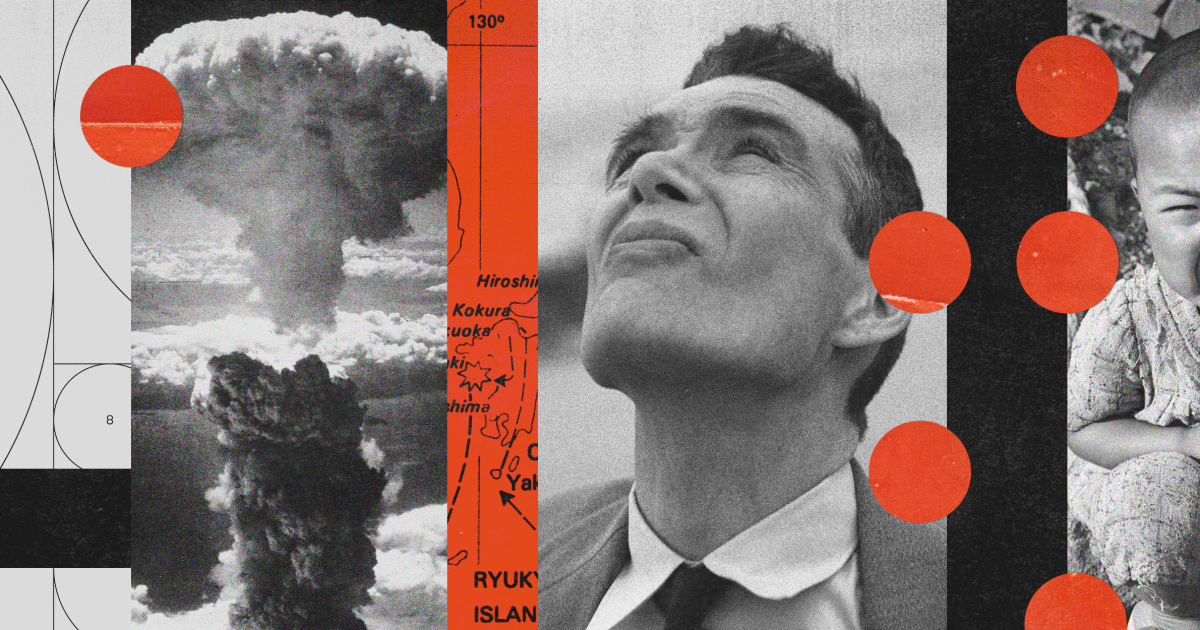Viewers are divided over whether the film should have shown Japanese victims of the weapon created by physicist Robert Oppenheimer. Experts say it’s complicated.
Clickbait outrage. The movie showed what the bomb does to people without feeling like it was exploiting the suffering of innocent victims for the sake of a summer blockbuster.
The article even explains how: “In another scene, Oppenheimer gives a speech and, while looking into the crowd, visualizes some of the predominantly white audience as the victims of his bomb.”
It’s an effective scene. Sometimes what you don’t show (negative space) is as powerful as what you do show.
Well of course it’s not, the us government wants to remind everyone that the bombings were a ‘nessicary evil’ that bs is still taught in schools. Not being a conspiracy guy but I cant imagine a high budget highly publicized movie would rock the boat like that. If you want to hear about sloughing go listen to the last podcast on the lefts 6 part magnum opus on the Manhattan project.
Well of course it’s not, the us government wants to
The movie does a decent job portraying why nuclear bomb development was so much more complex than simply a necessary evil, a good, or an unnecessary evil. It’s just not a simple topic with easy answers.
The left is not in agreement about the usage or development of the bombs.
Quite frankly if the U.S. didn’t develop it, Germany would have. And they would have used it just like the United States did.
Germany was already defeated and occupied, so I have a hard time following your logic.
Not great logic saying that Germany would have. But he does have a small point. A lot of our reason for developing it was because we thought Germany had been working on it. Our development started before Germany had been defeated and we had reason to believe (via espionage) that they at least had collected the materials needed, and had scientists familiar with the physics. After the war, we discovered that their program was no where close to actually making a bomb. We probably could have, and maybe should have stopped once Germany fell.
When the bombs were ultimately dropped, yes, but the Manhattan Project (actual development of the bomb) took place coinciding with the Nazi nuclear program before the defeat of Nazi Germany.
The Nazis actually started ahead of the Americans in 1939, and had the scientist who discovered nuclear fission as part of the program. The Nazis by all accounts had a head start and better scientists.
It wasn’t until it was clear the Nazis were using heavy water (i.e focusing on nuclear reactors) in 1942 that the US got the first clue that the Nazis had abandoned the idea of nuclear bombs in the war effort, but the project was still funded in Nazi Germany until the end of the war in 1945.
So not to sound like I fully support the bombings, but they did touch in the movie about why it was a good thing. To save not only hundreds of thousands of American soldiers who would have invaded mainland Japan, but also the (potentially) greater amount of Japanese soldiers and citizens that would have died too. Millions to die because conventional war tactics weren’t enough to scare the Japanese.
They were hard-core. They took the fire bombings (which had killed many more than the nukes) in stride. They raped Nanking with unimaginable horrors. Countless human atrocities in the name of “science”
The Japan of today in not the Japan on WW2. There’s a good amount of people who would say the nukes were a merciful way to end the war. The US, in prep for the mainland assault, made the amount of purple hearts they thought they would need for just the wounded. Since the assault never happened, we still hand them out to this day
This is a really common line that is patently false, the nukes had very little to do with triggering the Japanese surrender. The meeting to discuss surrender occured days after the first bombing, and started prior to the second bomb. I wasn’t privy to the Council discussions, obviously, but it is exceedingly unlikely they would sit around for days after the first bombing before meeting to discuss surrender. What did happen immediately prior to the surrender meeting was the Soviet invasion.
The nuking, of primarily non-military targets by the way, was largely a show of force demonstration to the soviets. It was not a “necessary evil” to save lives, and it was sure as hell not a mercy.
The Soviet invasion…
of the Kuril islands, Manchuria, and South Sakhalin. None of which were part of the Japanese mainland.
Yes, this did contribute to the surrender of Japan as they realized the USSR would not act like a neutral third party, but it did not cause the surrender.
The nuclear bombings of the mainland contributed quite a lot to the surrender effort as well, arguably moreso (or at least equally to) than the Japanese occupated territories.It’s hard to claim the nuclear bombs were a major contributor to their surrender when Japan was trying to surrender before the first bomb dropped. What made the surrender difficult was the ally’s demand that the Japanese emperor be stripped of his power. This was a big ask at the time, since the emperor was directly tied into Japanese religion.
In addition to this, the American military were committing war crimes before the drop of the nuclear bombs. The American military was killing more japanese citizens in there multiple night time carpet bombing runs than they did with the nuclear bombs.
The nuclear bomb was not “to end the war” because the war was already over when Truman decided go ahead and use then. The nuclear bomb was to show the USSR our military capabilities to scare them once the war ended.
It’s hard to claim the nuclear bombs were a major contributor to their surrender when Japan was trying to surrender before the first bomb dropped
They had a minority interest in surrendering before the first bomb dropped. The Fire Bombing of Tokyo civilan centers (arguably a worse atrocity than the bombs) had their morale and their communications broken, but every source I’ve ever read concludes that they genuinely were not ready to surrender, and it would have taken an actual mini-coup to do so, one that seemed to not be happening.
That doesn’t mean the bombs were necessary. They were, however, contributors to the surrender. The Japan preparing to rally from having their capital razed, civilian targeting worse than they had seen either side commit in the war, was suddenly struck with Hiroshima being vaporized.
I DO believe they were in the process of surrendering when the bomb hit Nagisaki.
Taking a step back, the bigger question is whether there are wrong ways to win a war. The US took Japan to surrender using 4(or more?) of the biggest civilian-targetting mass-death events in human history. We destroyed their civilian economy with lethal force in preference to destroying their military infrastructure. I think that was unacceptable.
But it DID contribute to the surrender.
Nanking?
Most of the current US naval command at the time later said the bombings were completely unnecessary. Your rhetoric is unsupported historical revisionism with the purpose of providing rhetorical cover for war crimes.
Ok but what about nanking?
Oh, Japanese soldiers that the victims of the bombings had no control over doing war crimes surely means the victims of US war crimes had it coming.
So, you’d rather send in an all out invasion like they were planning on doing?
I’d rather the US just let them surrender on the condition that the emperor remained, as that is what ended up happening anyway. All those deaths between the offer being rejected and the unconditional surrender were pointless.
I’d rather there be no war but ok
Heh, first it was criticism of the credits, now is what should and shouldn’t be in the movie. If you know better, why don’t you make your own movie that will put Nolan to shame?
What was with the credits?
That it didn’t include all people responsible for VFX.
The 70mm IMAX version basically hit the limit of the length the equipment can handle, and even treaties special extensions: https://youtu.be/d5XqqylBW7M?t=592
Is quite cool to watch the whole video, which they show how the movie is prepared before it can be projected.
hit the limit of the length
Thanks for the reminder that it’s 3 hours long, the thread was making me want to go and see it.
It was among the fastest 3 hours of my life friend, I definitely recommend it. Masterpiece.
Nolan pushed the limit of IMAX projectors with Interstellar run time in 2014, he went out of his way to find out what the maximum that could be done with platter modifications, an extra 20 minutes.
At the end of the day, humans don’t need weapons to display cruelty. We have popped many eyes with our thumbs over the eons.
I agree with the experts. I mean ppl can have an opinion but I wasn’t on the storyboard team so I have no clue whether that would even fit the storyline they were following and whether it would help the story in furtherance.
I get the opinion, I don’t see why we need an article about it.
The story is not about bombing Japan.
Yes, that was a war crime. Yes, that was terrible.
But if you know the story of Oppenheimer, or seen the movie, he did not decide anything. The military took over at that moment in time.
So if it was a movie about the military, this had to be shown. But it is about him. So a suggestion (as is clearly in the movie for about the last hour or so) is more than enough of you ask me.
He decided to make the bomb. He knew what bombs are used for.
Agreed, but that is not what the movie is about.
He did say (no one knows what he believed) that just having the bomb would mean world peace…
Then he was a fool who’s actions contributed to the murder of hundreds of thousands.
Used on a nation who’s army’s actions led to the murder of millions
You can’t use a weapon on a nation, you can only use a weapon on a nation’s population.
Look up projected casualties for Operation Downfall
Look up most of the contemporary US pacific command saying the bombings were unnecessary. I know Asian people are just ants to people like you but Jesus, the pathetic rationalizations.
Ants is a pretty apt comparison to Japanese culture at the time. All expected to become soldiers and die for the hive. Seriously, shit was crazy. They were not going to surrender otherwise.
Firebombings were daily killing more than the bombs did as well.
Ants is a pretty apt comparison to Japanese culture at the time.
Okay, thank you for proving my point and admitting you’re a virulent racist so publicly.
Being so far removed from the use of his discovery and put of the loop now the army was done with him is a crucial character moment in the film, and we as the audience are following his story. Having scenes of the bombing, the aftermath of the victims would have undermined that.
The US is in complete denial of the genocide they did dropping two nuclear bombs in two different cities with mostly just civilians. Everybody else in the world see the pictures of the Japanese aftermath when we study the second world war.
That’s not remotely true. American students learn extensively about the dropping of the bombs and their aftermath.
I was gonna say… where is this US denial narrative from? Just stop it.
I saw those pictures in school. We know that Truman signed off on dropping the bomb on two civilian cities and it was a horror that had never been seen in the world before or since.
Dude, we talk about our atrocities all the time. The current push to whitewash Native American genocide and slavery is actually getting a huge pushback, because we talk openly about this stuff in the US and it’s only a minority that tries to silence it. We talk openly about the atrocities during the Vietnam War, and about the invasion of Iraq, and about prosecution for war crimes in Afghanistan and Iraq.
You can say a LOT about the US, and even the amount of denial we have about our standing in the world, but you can’t call us in denial about stuff like that. We’re in conflict within ourselves about it, but it’s a well known and well discussed thing in the US.
And wait… are you from lemmygrad? The tankie server?
Talk is cheap in a country that has a history of blood on its hands. Pushback on rhetoric isn’t the only thing worth being proud about nor is it very productive. Just as another user pointed out, there’s no material solutions being offered to the remainders of a group that was victim of colonialism, that is still prevalent today.
Every great nation has blood on its hands. The Japanese aren’t exactly Mother Theresa’s themselves. Oh and they shouldn’t have attacked us if they didn’t want to deal with the consequences. They had no problem killing or injuring thousands of our service men and women. Oh……THAT. Give it a rest.
That isn’t a genocide.
Sure show the Japanese victims, but then you need to show why they were victims in the first place. So you need to show Japanese Imperialism that committed atrocities in Nanking and the attack on Pearl Harbour.
Maybe we could go further and show that Japanese Imperialism was driven by the existential threat of Western Imperialism, which does not in any way lessen the horrors committed by Imperial Japan.
Sometimes the whole story can’t be told in a single film. Not all of it is important to the message or topic the author, director and producers wish to send or examine.
They were victims. The nukes were war crimes. Show the victims.
Ultimately though a lot of Nolan’s films are coded for a Conservative viewpoint going back to the Batman trilogy. There’s still quite a bit of it here, even if this movie is intended to depict the honesty of nuclear weapons.
Ultimately though a lot of Nolan’s films are coded for a Conservative viewpoint
Wat
Removed by mod
At the end of the day, Japan and the US owe various parts of the world a lot of apologizing for shit done during WW2 and this is not me playing both sides. I am very familiar with Nanjing, Unit 731, and the comfort women thing.
Yeah, those Japanese civilians and Korean slaves sure deserved it /s
Yeah, thousands of victims were Korean slaves. Chew on that.
I agree with you that the Japanese military committed horrific atrocities, but from my pov, showing the direct devastation the bomb had demonstrates (among other things) the significance, impact, and importance of the creation of the bomb. That demonstration bears relevance in a story about the creator’s life and legacy in a way that Japanese atrocities don’t.
How many of Unit 731 did your nukes kill?
will Japanese directors show the camps of sex slaves they have in China or Korea? of course not
so there is your answerWhataboutism is not helpful.
The entire premise of the article is literally whataboutism
What? How? It’s discussing whether the victims of the bomb Oppenheimer created should be represented more. It’s a direct result of his actions and germane to the plot.
What about the victims of the bomb? Okay we put them in the movie. What about the victims of the Japanese? Okay we put them in the movie. What about what about what about
And now we just have a movie that’s a documentary on all of human history.
The movie is about the creation of the bomb. Stop.
What about the victims of the bomb
That’s not… Whataboutism. Whataboutism is a tu quoque style counter-argument.
This article is just people discussing other things that could be in the film.
The “whatabout what the Japanese did?” is whataboutism. It’s a cheap diversionary tactic used by defensive people when a discussion makes them uncomfortable.
That’s not what a whataboutism is, at least in common parlance. What the OP of this particular thread was saying, though, was. The idea is that people should aim to be better than lower common denominators.
Your version of “what about” as being about inclusion is strangely almost the exact opposite.














